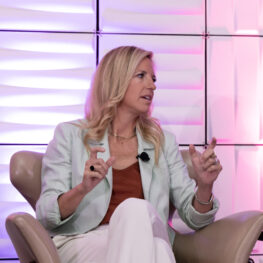Women in Sports Shaping the Future
Highlights from a Panel with Macaela MacKenzie, Jenny Nguyen, and Aly Wagner
At our 2024 Summit, presented by Team Milk, in Las Vegas in June, Girls on the Run hosted a panel on how women in sports are shaping the future. Moderated by Girls on the Run CEO Liz Kunz, the panel featured:
- Macaela MacKenzie, author of Money, Power, Respect: How Women in Sports are Shaping the Future of Feminism
- Jenny Nguyen, owner and founder of The Sports Bra, the first sports bar focused solely on televising women’s sports
- Aly Wagner, former professional soccer player, two-time Olympic gold medalist, two-time Women’s World Cup bronze medalist, sports analyst, adidas representative and co-owner of Bay FC—one of the two newest teams in the National Women’s Soccer League
The panelists shared who influenced and inspired them, how they built their self-confidence, and how women athletes influence and inspire us all. Here are some highlights from the Q&A panel discussion. The responses have been edited for length and clarity.
Liz: You have each taken meaningful and inspirational paths in your lives. Who has influenced you or served as a source of inspiration?
Macaela: When I was coaching for Girls on the Run, I was new to New York and had just graduated college. [Coaching] influenced me and encouraged me to show up in the world in a different way. The girls that I coached had such a huge impact on me. I think about them all the time to this day. I share this organization in every talk I do. Everyone asks, “How can we support women’s sports?” Support girls in sports! Whatever that looks like in your life, do that!
Liz: How did you recognize your inner strength and build your self-confidence? And how do women athletes help fuel this in each of us?
Jenny: When I think about athletes and how they can inspire, I think that they are the ones who are their true selves.

Jenny Nguyen
They are not just a statistic. They don’t just win. They don’t just talk about the game. [Female athletes] bring all of themselves to the table – all the complexities, all their stories. And that’s why we love women’s sports.
Aly: I think athletes are emblematic of everything that we all want to exhibit in the world. And at times, it’s going to be empathy. When you see the racer pause for someone else who has fallen. Or you see a hard challenge, and someone is hurt, there is a moment of recognition that we are actually just humans. You also see the commitment, the dedication, the fight, the grind. When you think you can’t give anymore, and you give more. Emblematically, they are moments that are the rawest and purest emotions that we all want to experience.
Liz: Jenny, you depleted your life savings to open The Sports Bra. How did that feel as a risk-averse person?
Jenny: It’s pretty funny when you put it that way. I am a very risk-averse person… One day, I was sitting with my girlfriend at the time. We met playing basketball, and we both grew up loving it. I was on the fence on whether or not I was going to open The Sports Bra. I asked my girlfriend, “Can you imagine if, when we were 7 years old, our parents would have taken us to a place like The Sports Bra? What would that have been like? What kind of impact that would have had on me? To feel seen or represented. To look on the TV screen and see women playing the sport that I loved. And then to look into the space and see people cheering for those women on TV. What would that have felt like?” And so, when I thought about 7-year-old me, I thought, “I think I’ve got to do this. I’ve got to do this for her.” Even if one kid walked into The Bra and saw a future for themselves in sports, it would be worth it. That, to me, was my risk assessment. And I decided, let’s do it.
Liz: Nneka Ogwumike is a member of the Girls on the Run International board of directors, and Macaela, you interviewed her for your book. She told you, “I believe that it’s innate in women to be seekers of change because we want things to be better for ourselves.” In other words, women are often activists because we have to be. You share many powerful examples of women athletes fighting for equality and respect in your book. Which of these stories do you find particularly profound?

Macaela MacKenzie
Macaela: I had the privilege to talk to so many incredible athletes across sports, and one of the most common threads was this collective mindset in women’s sports – across sports, within sports – that was incredible. I think people sometimes forget that this is a fiercely competitive environment, but this incredible collaboration also happens.
Macaela relayed a story from her book about the US Women’s National Hockey Team to emphasize this collaboration. Before the 2017 World Championships, the team had medaled in every Olympics since the women’s competition debuted. And yet, while women’s soccer and basketball players were fighting for equal pay, these athletes were fighting for any pay. After discouraging negotiations with USA Hockey, the women’s team threatened to boycott the tournament. Rather than returning to the bargaining table and anteing up, USA Hockey tried to replace them with top college and high school players. However, rather than skate on the international stage, those young players stood with the professional players.
When you think about these girls who were getting this opportunity, that probably was the only chance they would ever have to put on a Team USA jersey in their whole life. That was something they were working for and dreaming of because there was no professional women’s hockey league in the country, so it was their one shot. For them to recognize, “This isn’t about me, this is about all of us, it’s about the collective.” That, to me, is so deeply embedded in the DNA of women’s sports, and that is why I’m so passionate about it. Everyone needs to pay attention to this! Because it is not just about the amazing athleticism, the competitiveness, and the athletic skill we see. It’s about what we can accomplish together.
Liz: Jenny, Macaela writes in her book, “Every time a WNBA game is played in a bar, or women’s Olympic events get prime-time coverage, or cities host viewing parties for the Women’s World Cup, respect for women’s worth grows. Seeing women in their fierce, sweaty, laser-focused glory chips away at the primitive stereotypes still trying to convince us that men are superior. But you have to SEE it. For women’s sports to have the power to change culture, we have to be able to actually watch them.” Unfortunately, that is hard to do, as only 5% of all TV sports coverage focuses on women athletes. I would love to hear your thoughts about this and why you feel so strongly about being an agent of change in this realm.
Jenny: That was one of the biggest reasons why I wanted to open The Sports Bra is to give people access. It was very clear to me that women’s sports had an incredible fan base, but it was hard to tell that to the general public. You would constantly hear that old refrain, “Nobody watches women’s sports.” How can you be a fan of something you cannot see? How can we inspire more girls to play sports? Thousands of studies show all the benefits to girls throughout their entire lifetimes of playing sports. Why wouldn’t you want that for our kids? … And when we opened The Bra, there were people who came in who were in their 70s and literally cried in my arms and said, “I never thought I would live to see the day where a space like this existed.”
Liz: Macaela, you state that you are always asked two questions regarding equality in women’s sports: 1. Have we reached a tipping point for equality in sports? and 2. What does real transformation look like?
Macaela: When I think about what real equality looks like in women’s sports, I think equal pay, equal opportunity, equal marketing budgets, and equal playing conditions. You can’t even have a conversation about equality until that’s done. What real equality looks like when we have as many passive fans as men’s sports. In two or three instances, I’ve overheard two men talking about Catlin Clark. There is real progress that is happening. But in reporting for the book and learning so much about the history of women’s sports, there have been so many moments we felt like surely this is the tipping point. Like Aly, in the 2004 Olympics, you won a gold medal. There was all this energy. Things are going to change now, right? And then they don’t. And they don’t. And they don’t. That was one of the biggest takeaways from the book for me. Progress is never guaranteed, and it’s not linear. If there is ever a moment where you think, “We did it! We can take our foot off the gas!” Don’t. It really has to be a consistent effort to keep championing these girls and women.

Aly Wagner
Liz: The vast majority of professional sports teams are owned by men. As one of the current owners of a national women’s soccer league team (Go Bay FC!), why does ownership matter?
Aly: I have two perspectives: one as a player and one as an owner. I’ll share my perspective as an owner. Just having a voice in the room and being able to lead the direction of the business is everything. The title of Macaela’s book says it. Getting more women into ownership, getting more women in the boardroom, and having women driving that conversation is incredibly important. They are the decision-makers. They are the ones who are probably dreaming big and the ones who will take more risks because we actually don’t have as much to lose. When you think about business, you think about risk versus reward calculation. Jenny, you did it when you opened The Bra. If you have women founders and leaders, there will be an acceleration in what we can do in this space. It took men a long time to see the value in women’s sports. It did not take women long at all. And now we’re getting the resources to bring it to life. We still need women investors. We need more women leading these movements. We need more women coming together at a high level to drive change on a quicker trajectory.




